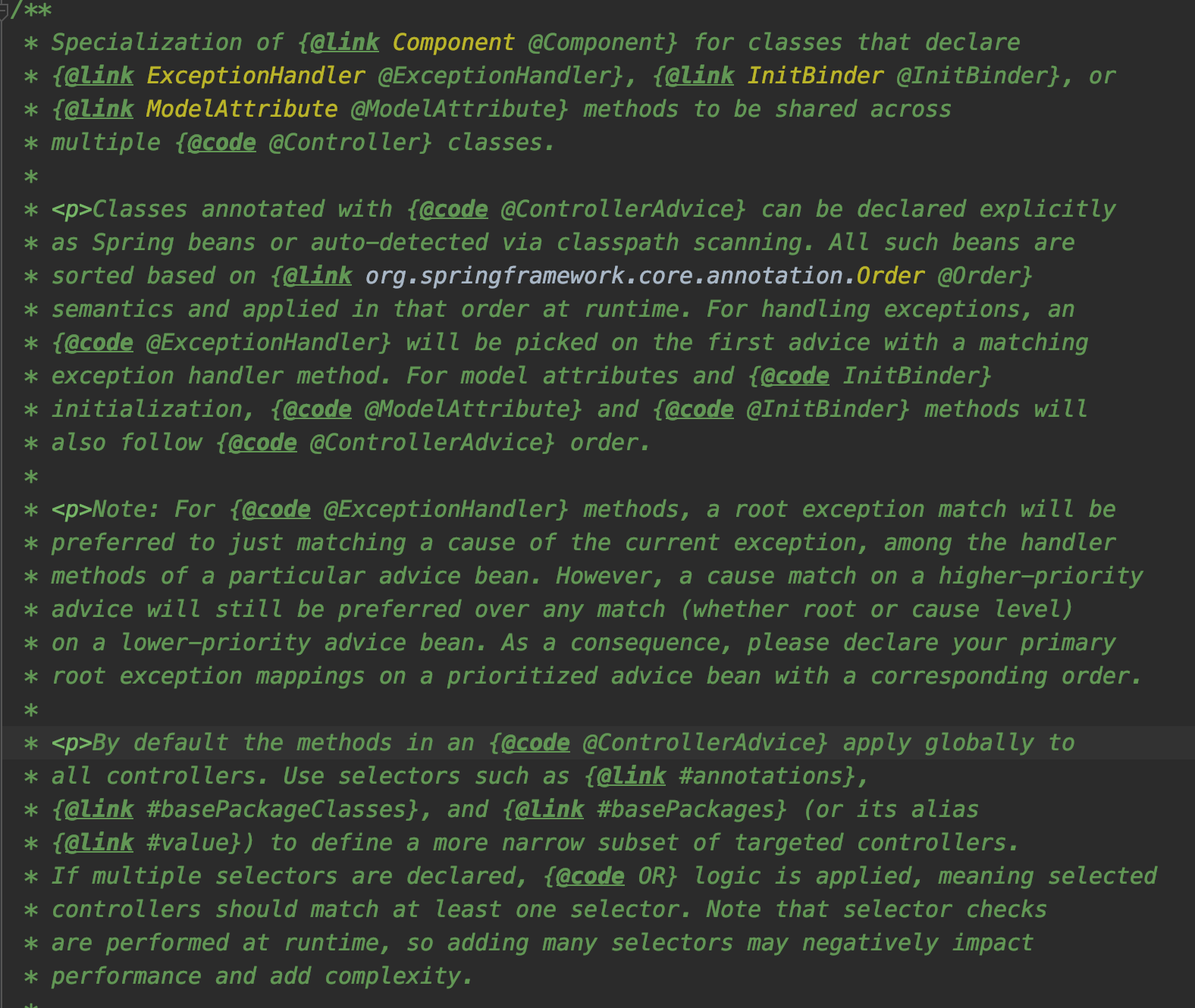聊一聊 SpringBoot 中的一些被忽视的注解
之前在老的项目中看到了一个比较有趣的现象
有一个需求是需要对返回的数据进行加解密的操作,部分老代码是直接硬编码在项目中,但是后来有人改了一版,称之为 1.0 版本
1.0 版本是通过切面配合注解进行处理,大致的处理流程是对返回的对象通过反射遍历字段,如果发现字段上有指定的注解,则进行加密操作,如果发现该字段是一个对象的话,则进行递归处理,直至结束
后来有一个需求是对返回的手机号、身份证信息只需要对中间的信息进行加密,两边不处理…其他的例如家庭地址、家庭成员全部加密为密文
拿到这个需求的时候,想改也挺简单,只需要增加一个新的注解,然后替换该切面扫描到的返回值进行替换注解就可以了
但是这样会导致切面里面的代码越来越臃肿,于是后来通过 RestControllerAdvice 进行了一个优化处理
今天就来聊一聊这两个被忽视的注解
@ControllerAdvice

通过上述的描述我们可以知道该注解是可以在多个 Controller 中共享一些操作,配合 ExceptionHandler、InitBinder 等,可以在请求数据进入 Controller 之前进行一个预处理,减少代码中的硬编码部分。
对于 ExceptionHandler 大家可能不会很陌生,一个通用的异常处理,如果项目不是纯 dubbo 对外提供接口的话,那么应该是会用到该注解的
ExceptionHandler
这个注解可以定义一个全局的异常处理器,可以将指定的异常转换为约定的格式返回,例如:
1 |
|
这样,一旦 Controller 里面抛出了 BusinessException,于是返回自动就变成了这种自定义的 XXX
不用每一次都在 Controller 中手动捕获异常然后转换成 code,从业务的角度来说只需要区分各种异常,然后统一地方进行收口处理,尽最大的努力避免对业务代码的入侵
1 | code:1-99:参数问题 |
InitBinder
该注解可以在请求参数进入 Controller 之前进行预处理,但是这个不能作用于 @RequestBody(这个注解是通过RequestBodyAdvice来生效的,不是同一个流程),这样就可以做一些比较好玩的操作了
优势一:
例如一个请求的 url 是 localhost:8081/controller/testAdvice?advice=1-2
在业务中如果要接收这个参数是需要将 advice 定义为 String,那么如果想直接用对象来接收,会直接抛出一个异常
1 |
|

如果非要用对象来接收,这个时候就可以通过 InitBinder 来实现了
GlobalAdvice
1 |
|
ProductEditor
1 | public class ProductEditor extends PropertyEditorSupport { |
此时再次请求 localhost:8081/controller/testAdvice?advice=1-2 就会发现是正常展示了
优势二
可以解析前端 form-data 提交过来信息,在对象处理之前进行格式化,避免出错
1 |
|
此时 Date 就会在这里统一格式化,十分的方便
优势三
配合 Validator 来使用
通过实现 Validator 这个类来实现一些复杂的检验规则,例如要求年龄大于1岁的,必须要有姓名,在这个场景下普通的校验规则就无法满足的,所以这个时候可以自定一个规则
1 |
|
1 | public class AdviceValidator implements Validator { |
同时该注解也无需在实体类上面进行任何操作,很方便的进行扩展,通过配置中心,可以实现定制化的控制规则,方便运营及时的调整规则,实时生效
@RestControllerAdvice
官网的介绍如下:
convenience annotation that is itself annotated with @ControllerAdvice and @ResponseBody
表示这个注解包含了上面的 ControllerAdvice 以及 ResponseBody,
作用是可以对入参的 @RequestBody 和 @ResponseBody 进行处理,常见的如对返回数据加密等操作
例如刚才的 Advice 类,如果需要对其的 name 统计进行小写转大写(这里只是做展示,实际情况可能是对name进行加密操作),如果在业务代码中进行处理,那么会造成一种硬编码,
ResponseBodyAdvice
Allows customizing the response after the execution of an @ResponseBody or a esponseEntity controller method but before the body is written with an HttpMessageConverter
也就是说可以在 HttpMessageConverter 调用之前,对返回的对象进行处理,而 HttpMessageConverter 由于不在本文范畴,暂时忽略,但是需要记住这个类是将返回的对象处理成 json 的地方
1 | /** |
1 |
|
当定义好上述两个类以后,则只需要在方法上加上该注解即可。
1 |
|
此时 name 就会被转为大写,如果需要对入参进行处理,实现 RequestBodyAdvice 即可,相同的道理
思考
在业务代码中,如果需要对 controller 层返回的数据进行加解密操作,有两种选择,一种是切面配合反射来遍历对象的字段判断是否包含指定的注解,如果含有的话,则直接进行加解密操作
还有一种就是今天的 RestControllerAdvice 扫描指定的包然后进行操作
如果是通过切面来进行处理,那么每一个返回的对象都必须明确的指明加解密的类型以及字段,需要配合注解使用,但是如果用 RestControllerAdvice 是否会是一个更好的选择呢?
显然,这两种方式个人认为切面比较不优雅,主要无法解耦,当需要扩展一个注解的功能时,会修改切面里面的代码,而且如果需要对返回的数据进行按照顺序处理,如果使用 RestControllerAdvice,那么直接使用 @Order 注解使用
聊一聊 SpringBoot 中的一些被忽视的注解
https://somersames.github.io/2021/04/05/talk-about-springboot-anno/